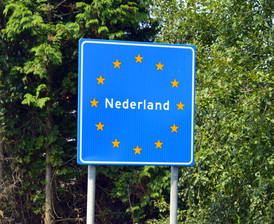Dutch begin media offensive on EU border controls, ahead of presidency
 Dutch prime minister Mark Rutte and finance minister Jeroen Dijsselbloem are both widely quoted in foreign media on Friday, warning about the impact of Europe’s failure to properly secure its borders.
Dutch prime minister Mark Rutte and finance minister Jeroen Dijsselbloem are both widely quoted in foreign media on Friday, warning about the impact of Europe’s failure to properly secure its borders.
Rutte said in an interview with the Financial Times that the Roman empire collapsed because it did not monitor its borders. Europe, he said, awaits the same fate if it does not take action to stop the ‘massive influx’ of people from the Middle East and central Asia.
‘As we all know from the Roman empire, big empires fail if the borders are not well-protected,’ the FD quotes Rutte as saying. ‘So we really have an imperative that it is handled.’
The Netherlands takes over the rotating presidency of the EU on January 1.
Meanwhile, finance minister and Eurogroup chief Jeroen Dijsselbloem has placed ‘a bomb’ under the Schengen accord on passport-free travel, the Financieele Dagblad says.
In an interview with various European newspapers, Dijsselbloem said he is ‘not very optimistic’ about the survival of the Schengen agreement, which abolished border controls within most of the EU.
The countries which have been hardest hit by the rise in refugee numbers might be ‘forced to take measures to close their borders,’ Dijsselbloem is quoted as saying by German paper Handelsblatt.
The countries affected – Germany, the Netherlands, Sweden, Austria and Belgium – might have to form a ‘mini-Schengen’, he said, adding that this will have negative political and economic effects on the EU itself.
Solidarity
Dijsselbloem also accused other EU countries of lacking solidarity by not doing their fair share to ease the refugee crisis. ‘I wish the best of luck to countries which say it is not their problem,’ he said. ‘We have a lot of mechanisms to ensure solidarity within the EU,’ the FD quotes him as saying.
Last week, the Telegraaf said the cabinet is looking at the option of developing a smaller open border area. The current Schengen zone for passport-free travel comprises 22 EU member states and four non-members.
However, the FD says Germany is opposed to the idea of a mini-Schengen because it does not include France. Dijsselbloem did not mention France in his comments, the paper points out.
Thank you for donating to DutchNews.nl.
We could not provide the Dutch News service, and keep it free of charge, without the generous support of our readers. Your donations allow us to report on issues you tell us matter, and provide you with a summary of the most important Dutch news each day.
Make a donation